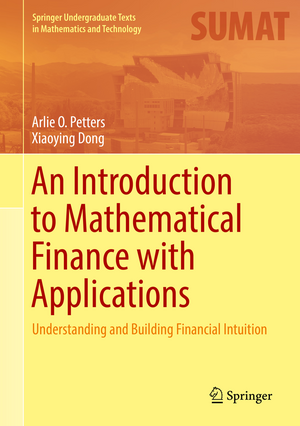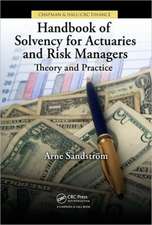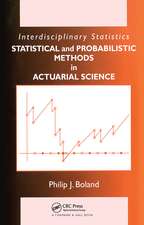An Introduction to Mathematical Finance with Applications: Understanding and Building Financial Intuition: Springer Undergraduate Texts in Mathematics and Technology
Autor Arlie O. Petters, Xiaoying Dongen Limba Engleză Hardback – 18 iun 2016
The book is aimed toward advanced undergraduates and first-year graduate students who are new to finance or want a more rigorous treatment of the mathematical models used within. While no background in finance is assumed, prerequisite math courses include multivariable calculus, probability, and linear algebra. The authors introduce additional mathematical tools as needed. The entire textbook is appropriate for a single year-long course on introductory mathematical finance. The self-contained design of the text allows for instructor flexibility in topics courses and those focusing on financial derivatives. Moreover, the text is useful for mathematicians, physicists, and engineers who want to learn finance via an approach that builds their financial intuition and is explicit about model building, as well as business school students who want a treatment of finance that is deeper but not overly theoretical.
| Toate formatele și edițiile | Preț | Express |
|---|---|---|
| Paperback (1) | 404.20 lei 6-8 săpt. | |
| Springer – 31 mai 2018 | 404.20 lei 6-8 săpt. | |
| Hardback (1) | 404.25 lei 3-5 săpt. | +60.91 lei 6-10 zile |
| Springer – 18 iun 2016 | 404.25 lei 3-5 săpt. | +60.91 lei 6-10 zile |
Din seria Springer Undergraduate Texts in Mathematics and Technology
-
 Preț: 417.98 lei
Preț: 417.98 lei -
 Preț: 496.21 lei
Preț: 496.21 lei - 13%
 Preț: 357.85 lei
Preț: 357.85 lei - 15%
 Preț: 490.80 lei
Preț: 490.80 lei -
 Preț: 412.77 lei
Preț: 412.77 lei -
 Preț: 377.87 lei
Preț: 377.87 lei - 13%
 Preț: 388.57 lei
Preț: 388.57 lei - 17%
 Preț: 365.98 lei
Preț: 365.98 lei - 17%
 Preț: 367.29 lei
Preț: 367.29 lei -
 Preț: 998.04 lei
Preț: 998.04 lei -
 Preț: 388.74 lei
Preț: 388.74 lei - 15%
 Preț: 484.31 lei
Preț: 484.31 lei -
 Preț: 388.91 lei
Preț: 388.91 lei -
 Preț: 472.89 lei
Preț: 472.89 lei -
 Preț: 422.00 lei
Preț: 422.00 lei - 15%
 Preț: 479.42 lei
Preț: 479.42 lei -
 Preț: 246.75 lei
Preț: 246.75 lei -
 Preț: 407.44 lei
Preț: 407.44 lei -
 Preț: 407.57 lei
Preț: 407.57 lei - 15%
 Preț: 518.50 lei
Preț: 518.50 lei - 15%
 Preț: 483.32 lei
Preț: 483.32 lei -
 Preț: 421.91 lei
Preț: 421.91 lei - 20%
 Preț: 338.50 lei
Preț: 338.50 lei -
 Preț: 660.93 lei
Preț: 660.93 lei - 15%
 Preț: 484.13 lei
Preț: 484.13 lei -
 Preț: 457.53 lei
Preț: 457.53 lei - 15%
 Preț: 501.28 lei
Preț: 501.28 lei - 20%
 Preț: 424.21 lei
Preț: 424.21 lei -
 Preț: 1072.23 lei
Preț: 1072.23 lei -
 Preț: 390.71 lei
Preț: 390.71 lei -
 Preț: 390.64 lei
Preț: 390.64 lei - 19%
 Preț: 474.42 lei
Preț: 474.42 lei
Preț: 404.25 lei
Preț vechi: 475.59 lei
-15% Nou
Puncte Express: 606
Preț estimativ în valută:
77.42€ • 79.00$ • 65.13£
77.42€ • 79.00$ • 65.13£
Carte disponibilă
Livrare economică 05-19 februarie
Livrare express 21-25 ianuarie pentru 70.90 lei
Preluare comenzi: 021 569.72.76
Specificații
ISBN-13: 9781493937813
ISBN-10: 1493937812
Pagini: 487
Ilustrații: XVII, 483 p. 52 illus., 12 illus. in color.
Dimensiuni: 178 x 254 x 30 mm
Greutate: 1.51 kg
Ediția:1st ed. 2016
Editura: Springer
Colecția Springer
Seria Springer Undergraduate Texts in Mathematics and Technology
Locul publicării:New York, NY, United States
ISBN-10: 1493937812
Pagini: 487
Ilustrații: XVII, 483 p. 52 illus., 12 illus. in color.
Dimensiuni: 178 x 254 x 30 mm
Greutate: 1.51 kg
Ediția:1st ed. 2016
Editura: Springer
Colecția Springer
Seria Springer Undergraduate Texts in Mathematics and Technology
Locul publicării:New York, NY, United States
Cuprins
Preface.- 1. Preliminaries and Financial Markets.- 2. The Time Value of Money.- 3. Markowitz Portfolio Theory.- 4. Capital Market Theory and Portfolio Risk Measures.- 5. Binomial Trees and Security Pricing Modeling.- 6. Stochastic Calculus and Geometric Brownian Motion Model.- 7. Derivatives: Forwards, Futures, Swaps and Options.- 8. The BSM Model and European Option Pricing.- Index.
Recenzii
“The book is thick with rich with applications and solid justifications of all concepts. … If you are a financial mathematics instructor, this book is for you. It progresses through easier topics to more advanced topics very well and is practical, meaningful, and more importantly, relevant to the 21st century financial student. … can be used as the one standard book for your class but can also be a springboard to research projects with your more advanced and curious students.” (Peter T. Olszewski, MAA Reviews, August, 2017)
“This self-contained book is well organized and covers a broad range of classical topics of financial mathematics. A rich source of examples and exercises, the book is an ideal textbook for both undergraduate and graduate students that are interested in mathematical models in finance. The book can also be used for mathematically trained students and individuals in actuarial science to prepare for professional exams.” (Zhuo Jin, Mathematical Reviews, May, 2017)
“The book is an undergraduate textbook in mathematical finance with applications. … The textbook is aimed at advanced undergraduates, and also at master's degree students who want a more rigorous treatment of the mathematical models in finance. This text will be a very good textbook for a year-long course on introductory mathematical finance.” (Anatoliy Swishchuk, zbMATH 1348.91002, 2016)
“This self-contained book is well organized and covers a broad range of classical topics of financial mathematics. A rich source of examples and exercises, the book is an ideal textbook for both undergraduate and graduate students that are interested in mathematical models in finance. The book can also be used for mathematically trained students and individuals in actuarial science to prepare for professional exams.” (Zhuo Jin, Mathematical Reviews, May, 2017)
“The book is an undergraduate textbook in mathematical finance with applications. … The textbook is aimed at advanced undergraduates, and also at master's degree students who want a more rigorous treatment of the mathematical models in finance. This text will be a very good textbook for a year-long course on introductory mathematical finance.” (Anatoliy Swishchuk, zbMATH 1348.91002, 2016)
Notă biografică
Arlie Oswald Petters is a Professor of Mathematics, Physics, and Business Administration at Duke University. Petters is also co-author of Birkhauser's Singularity Theory and Gravitational Lensing.
Xiaoying Dong is an Adjunct Assistant Professor of Mathematics at Duke University and has been a professional trader for over 20 years.
Textul de pe ultima copertă
This textbook aims to fill the gap between those that offer a theoretical treatment without many applications and those that present and apply formulas without appropriately deriving them. The balance achieved will give readers a fundamental understanding of key financial ideas and tools that form the basis for building realistic models, including those that may become proprietary. Numerous carefully chosen examples and exercises reinforce the student’s conceptual understanding and facility with applications. The exercises are divided into conceptual, application-based, and theoretical problems, which probe the material deeper.
The book is aimed toward advanced undergraduates and first-year graduate students who are new to finance or want a more rigorous treatment of the mathematical models used within. While no background in finance is assumed, prerequisite math courses include multivariable calculus, probability, and linear algebra. The authors introduce additional mathematical tools as needed. The entire textbook is appropriate for a single year-long course on introductory mathematical finance. The self-contained design of the text allows for instructor flexibility in topics courses and those focusing on financial derivatives. Moreover, the text is useful for mathematicians, physicists, and engineers who want to learn finance via an approach that builds their financial intuition and is explicit about model building, as well as business school students who want a treatment of finance that is deeper but not overly theoretical.
The book is aimed toward advanced undergraduates and first-year graduate students who are new to finance or want a more rigorous treatment of the mathematical models used within. While no background in finance is assumed, prerequisite math courses include multivariable calculus, probability, and linear algebra. The authors introduce additional mathematical tools as needed. The entire textbook is appropriate for a single year-long course on introductory mathematical finance. The self-contained design of the text allows for instructor flexibility in topics courses and those focusing on financial derivatives. Moreover, the text is useful for mathematicians, physicists, and engineers who want to learn finance via an approach that builds their financial intuition and is explicit about model building, as well as business school students who want a treatment of finance that is deeper but not overly theoretical.
Caracteristici
Provides a good balance between mathematical derivation and accessibility to the reader and instructor Self-contained with respect to required finance background, providing financial minutia along the way as needed Useful for students preparing for high level study in mathematical finance or a career in actuarial science Includes supplementary material: sn.pub/extras Request lecturer material: sn.pub/lecturer-material









